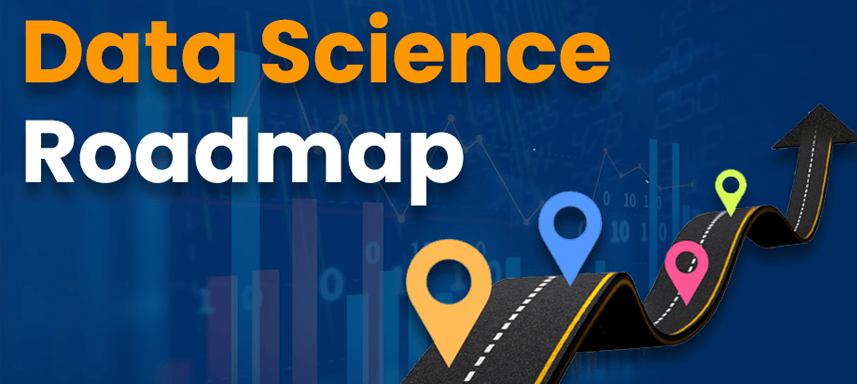In the dynamic landscape of technology and innovation, data science continues to hold a prominent position, driving insights, innovation, and decision-making across various industries. As we step into 2024, the field of data science is poised for further evolution, with new tools, methodologies, and challenges shaping the journey ahead. For aspiring data scientists and seasoned professionals alike, having a clear roadmap is essential to navigate this ever-changing terrain and achieve success. In this article, we'll outline a step-by-step data science roadmap for 2024, providing a structured guide to help you advance in your data science journey.
Step 1: Understand the Fundamentals
Every successful data scientist begins their journey by mastering the fundamentals of data science. Start by gaining a solid understanding of key concepts such as statistics, mathematics, and programming languages like Python and R. Invest time in learning about data manipulation, visualization techniques, and basic machine learning algorithms. Online courses, tutorials, and books can serve as valuable resources to build your foundational knowledge.
Step 2: Dive into Advanced Topics
Once you have a strong grasp of the basics, it's time to dive deeper into advanced topics within data science. Explore areas such as predictive modeling, natural language processing, deep learning, and reinforcement learning. Familiarize yourself with popular libraries and frameworks such as TensorFlow, PyTorch, and scikit-learn. Stay updated with the latest research papers and trends in the field to expand your knowledge and skill set.
Step 3: Build Practical Experience
Theory is important, but practical experience is invaluable in the world of data science. Work on real-world projects to apply your knowledge and gain hands-on experience. Collaborate with peers on data science competitions, contribute to open-source projects, or undertake internships and freelance gigs to sharpen your skills. Building a diverse portfolio of projects will not only enhance your resume but also demonstrate your expertise to potential employers.
Step 4: Develop Domain Expertise
Data science is not one-size-fits-all; it varies across different industries and domains. Identify areas of interest or industries where you'd like to apply your data science skills and start developing domain expertise. Whether it's finance, healthcare, e-commerce, or cybersecurity, understanding the specific challenges, regulations, and nuances of a domain will make you a more effective data scientist. Network with professionals in your chosen domain, attend industry conferences, and stay updated with domain-specific trends and developments.
Step 5: Cultivate Soft Skills
In addition to technical proficiency, soft skills play a crucial role in the success of a data scientist. Effective communication, problem-solving, critical thinking, and collaboration are essential skills that can set you apart in the field. Practice explaining complex concepts in simple terms, work on your presentation skills, and learn to collaborate with cross-functional teams. Cultivating these soft skills will not only make you a better data scientist but also enhance your ability to drive impact within organizations.
Step 6: Stay Updated and Adapt
The field of data science is constantly evolving, with new techniques, tools, and challenges emerging regularly. Make a commitment to lifelong learning and stay updated with the latest developments in the field. Follow influential figures in the data science community, participate in online forums and discussions, and enroll in advanced courses or certifications to stay ahead of the curve. Be adaptable and willing to embrace change as you navigate the ever-evolving landscape of data science.
Step 7: Contribute to the Community
Finally, give back to the data science community by sharing your knowledge and expertise with others. Whether it's through blogging, mentoring, teaching, or contributing to open-source projects, find ways to contribute and support the growth of aspiring data scientists. Not only does this help strengthen the community as a whole, but it also reinforces your own understanding and mastery of data science concepts.
Step 8. Foundational Skills
-
Math and Statistics: This includes linear algebra, calculus, probability, and statistics. These skills are essential for understanding data, building models, and interpreting results.
-
Programming: Python is the most popular programming language for data science, but R is also popular. You will need to learn the basics of programming, including data structures, algorithms, and libraries like NumPy, Pandas, and Matplotlib in Python or dplyr, ggplot2, and tidyr in R.
-
SQL: SQL is a query language used to communicate with databases. You will need to learn how to write SQL queries to extract data from databases.
-
Git and GitHub: Git is a version control system that allows you to track changes to your code and collaborate with others. GitHub is a platform for hosting Git repositories. Familiarity with these tools is essential for any programmer.
Step 9. Data Wrangling
- Data Cleaning: This involves identifying and correcting errors in data, such as missing values, inconsistencies, and outliers.
- Data Manipulation: This involves transforming data into a format that is suitable for analysis, such as creating new features and aggregating data.
Step 10 . Exploratory Data Analysis (EDA)
- Visualization: This involves creating charts and graphs to explore and understand data.
- Statistical Analysis: This involves using statistical methods to summarize and analyze data.
Step 11 . Machine Learning
- Supervised Learning: This involves training a model to make predictions based on labeled data. Common supervised learning algorithms include linear regression, logistic regression, decision trees, and random forests.
- Unsupervised Learning: This involves identifying patterns in unlabeled data. Common unsupervised learning algorithms include k-means clustering and principal component analysis (PCA).
- Deep Learning: This is a subfield of machine learning that uses artificial neural networks to learn complex patterns from data.
Step 12 . Communication and Collaboration
- Data Storytelling: This involves communicating your findings to others in a clear and concise way.
- Collaboration: Data scientists often work on projects with other team members, such as engineers and product managers. It is important to be able to collaborate effectively with others.
In conclusion, the journey to success in data science requires a combination of technical skills, domain expertise, soft skills, and a commitment to lifelong learning. By following this step-by-step roadmap for 2024, you can chart a clear path toward achieving your goals in the dynamic and rewarding field of data science. Embrace the challenges, stay curious, and never stop exploring the vast possibilities that data science has to offer.
13. FAQs:
-
Q: What academic background is required for a career in data science? A: While a background in computer science, mathematics, or statistics is beneficial, individuals from diverse academic backgrounds can pursue a career in data science with the right skill development.
-
Q: How long does it take to become a proficient data scientist? A: The time required to become proficient in data science varies depending on individual learning pace, prior experience, and the depth of knowledge desired. However, dedicating consistent time to learning and practical application is essential for skill development.
-
Q: What are the essential qualities of a successful data scientist? A: Successful data scientists possess a combination of technical skills, problem-solving abilities, curiosity, and effective communication skills. They are adaptable, creative, and committed to lifelong learning.





